What Liberals Get Wrong About ‘White Rural Rage’ — Almost Everything
Politico (archive.ph)
By Nicholas F. Jacobs
2024-04-05 09:00:00GMT
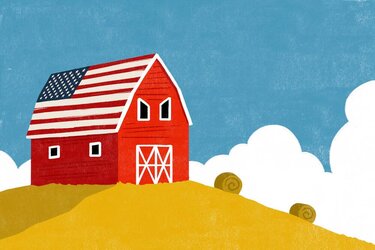
Illustration by Benedetto Cristofani for POLITICO
If you’ve been watching television or tracking trending topics over the last few weeks, you’ve probably seen or read something about “white rural rage.” This is owed to the publication of a new book, White Rural Rage, by Tom Schaller and Paul Waldman, whose thesis is that white rural Americans, despite representing just 16 percent of the American electorate, are a “threat to the world’s oldest constitutional democracy.”
In an interview on MSNBC’s Morning Joe, Schaller gave this unvarnished assessment of the rage he sees overflowing in the heartland. Rural whites, he said, are “the most racist, xenophobic, anti-immigrant, anti-gay geo-demographic group in the country.” He called them, “the most conspiracist group,” “anti-democratic,” “white nationalist and white Christian nationalists.” On top of that, rural whites are also “most likely to excuse or justify violence as an acceptable alternative to peaceful public discourse.”
This premise has triggered a backlash towards rural voters from some on the left. Amanda Marcotte, writing for Salon, said she’s tired of handling rural voters “with kid gloves,” and time has come to pop the “racist, homophobic, sexist bubble” they all live in. Daily Beast columnist Michael Cohen agreed, writing that “these aren’t hurtful, elitist stereotypes by Acela Corridor denizens and bubble-dwelling liberals… they’re facts.” David Corn, the D.C. bureau chief at Mother Jones, piled on, agreeing that “white rural voters [are] the slice of the public that endangers the constitutional future of the republic.”
This latest obsession with rural rage is nothing new. After 2016, when rural voters in Michigan, Wisconsin and Pennsylvania put former President Donald Trump over the top, Democrats tried to figure out why they had gone so sour on the Democratic Party. Some liberal thinkers called out the left’s reflexive condescension and dismissal of rural voters that escalated during the George W. Bush administration and peaked with Hillary Clinton’s campaign and her dismissal of Trump supporters as a “basket of deplorables.” Some said the party should increase attention to rural issues and nearby rural communities.
But don’t be misled. The publication and widespread celebration of White Rural Rage among progressive circles is doing something different than those post-2016 post-mortems. It is not an attempt to understand the needs and concerns of rural America. Instead, it’s an outpouring of frustration with rural America that might feel cathartic for liberals, but will only serve to further marginalize and demonize a segment of the American population that already feels forgotten and dismissed by the experts and elites.
The people doing the work of protecting democracy in rural America recognized this immediately. The morning of the MSNBC interview, I woke up to a mountain of messages and threads from rural organizers, community activists and local officials from across the country. Each one was distressed over what they considered the authors’ harsh and hurtful accusations about the communities they cherish and strive to uplift.
What seemingly set apart this book is that the authors claimed to have data backing up their assertions. “We provide the receipts,” Schaller said in the interview. What is their data, my friends and colleagues asked, and why do they get it so wrong?
Imagine my surprise when I picked up the book and saw that some of that research was mine.
I’m an academic who studies rural Americans and lives in rural Maine. My job and passion is to pore over reams of data, including some of the largest surveys of rural voters ever conducted. Sitting on my computer are detailed responses from over 25,000 rural voters that I have conducted over the last decade and used to publish a range of peer-reviewed and widely cited research. And I’ve done it all largely to make sense of why rural voters are continually drawn to the Republican Party.
But the thing about rage — I’ve never found it.
The problem with this “rage” thesis is much larger than the fact that my research, and that of others, is being misinterpreted and misunderstood. What the authors are getting wrong about rural America is exactly what many Democrats have been getting wrong for decades — and appear to be doing so again in this critical presidential election year.
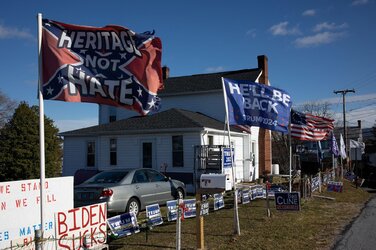
Academics can and do disagree on what is motivating non-college-educated whites to vote for Donald Trump. | Andrew Lichtenstein/Corbis via Getty Images
Beyond the weaknesses of this one book, and the prospects of another deeply divisive election, this new rage thesis worries me.
Academics can and do disagree on what is motivating non-college-educated whites to vote for Donald Trump. I don’t pretend that we have settled on a single answer. I do know that there is something particular about Trump’s appeal in rural America and that demographics alone do not explain it. In rural America, women are more likely to vote for Trump; so are young people; so are poor as well as rich. Place matters.
But ruralness is not reducible to rage. And to say so is to overlook the nuanced ways in which rural Americans engage in politics. They are driven by a sense of place, community and often, a desire for recognition and respect. This, as I have recently argued in a new book, is the defining aspect of the rural-urban divide — a sense of shared fate among rural voters, what academics call a “politics of place,” that is expressed as a belief in self-reliance, rooted in local community and concerned that rural ways of living will soon be forced to disappear.
In recent years, that rural political identity has morphed into resentment — a collective grievance against experts, bureaucrats, intellectuals and the political party that seeks to empower them, Democrats.
Yes, such resentment is a real phenomenon in rural areas. But words matter; rage and resentment are not interchangeable terms. Rage implies irrationality, anger that is unjustified and out of proportion. You can’t talk to someone who is enraged. Resentment is rational, a reaction based on some sort of negative experience. You may not agree that someone has been treated unfairly, but there is room to empathize.
Research both by me and by others has illuminated how resentment is driven by the complex rural identity that, while occasionally intersecting with national political currents, is rooted in the unique context of rural life. Rage, both as a soundbite and as presented in the book, oversimplifies and misrepresents these debates. And so does the assumption that all the holders of these views are white, and that this rage is motivated by racism. Racism exists in all parts of the country and is embedded in American politics. But what the research shows is that while there are deep and persistent racial resentments in rural communities, despite a slight correlation between the two, rural resentment is an attitude distinct from racial prejudice.

Paul Waldman and Tom Schaller suggest that since authoritarianism predicted support for Donald Trump in the 2016 Republican primaries, and rural residents support Trump, rural residents are the most likely to be authoritarian. | Spencer Platt/Getty Images
So far, Republicans are the political party that has figured out how to speak to that rural identity effectively.
I sympathize with the idea that, as Schaller and Waldman and many other commentators have pointed out, in terms of policies, Democrats arguably do more for rural areas and rural residents than Republicans do. After Democrats passed Obamacare, rural residents stood to gain the most in states that expanded Medicaid, but two-thirds of uninsured rural residents missed out because they lived in states that refused to expand coverage — and those states were almost exclusively governed by Republicans. Paul Krugman is often quick to point out that “ because rural America is poorer than urban America, it pays much less per person in federal taxes, so in practice major metropolitan areas hugely subsidize the countryside.” And it is true that the Biden administration is currently overseeing billions in new federal spending that is disproportionately going to rural communities across America.
So, the problem Democrats haven’t been able to solve isn’t policy; it’s politics. And Democrats who give in to the simplistic rage thesis are essentially letting themselves off the hook on the politics, suggesting that rural Americans are irrational and beyond any effort to engage them.
That would be a massive mistake, one that does truly threaten democracy. Democrats have an opportunity to do better in rural America. We need them to do better, not because Democrats’ policy fixes are always the solution, but because our political system only works when competitive elections hold officials accountable. One-party dominance throws the system off-center, misrepresents interests, sows distrust.
The first step for Democrats is to start thinking — and talking — about rural America right.

In the immediate aftermath of 2016, blaming rural people was a way to make sense of the surprise of Donald Trump’s election. | Michael S. Williamson/The Washington Post via Getty Images
Reading White Rural Rage won’t help with that. The authors have no expertise in rural issues and conducted no original research for the book. They approached the topic as journalists and committed the same errors countless reporters have made when they share with the outside world what they saw from a few days traversing some small town in “ flyover country” — an occurrence all the more routine as local newspapers in rural America shutter.
The authors of White Rural Rage make two persistent types of error in analyzing the data on rural Americans.
First, they routinely fall victim to the logical fallacy of composition when they attribute group characteristics to individuals. For example, they suggest that since authoritarianism predicted support for Donald Trump in the 2016 Republican primaries, and rural residents support Trump, rural residents are the most likely to be authoritarian. (That’s like concluding that because Massachusetts tends to vote Democratic, and Massachusetts is a wealthy state, wealthy people must vote Democratic … but the opposite is true.)
As it happens, the opposite seems to be true in this case as well; leading authoritarian experts find no geographic dimension to growing authoritarianism in the U.S., and the study the authors cite early in the book to “prove” that rural residents are “more likely to favor violence over democratic deliberation” says nothing about violence, or deliberation or authoritarianism. Work by scholars they cite actually shows the opposite, too: Rural residents are less, not more, likely to support political violence.
This same logical fallacy comes into play when they weave together a string of facts about Christian nationalists: Because white evangelicals are most likely to support Christian nationalist beliefs, and because 43 percent of rural residents identify as evangelical, they assert that the hotbed of Christian nationalism is in rural communities. The same goes for their assertions about QAnon. Perhaps the worst guilt-by-association error is found right in the title; even in the reddest of rural counties, 20 to 30 percent of voters — still largely white — routinely support Democrats. One might ask why, given all the supposed rage, are some rural Americans still voting for Democrats, election after election? You wouldn’t know it from the title or press tour, but Schaller and Waldman must frequently hedge their bets in the text, acknowledging that just a minority of rural residents often believe the most headline-grabbing factoid.

About 20 percent of rural Americans are non-white, and research shows that they share the same geography-based grievances as their white neighbors and are increasingly voting Republican. | David Goldman/AP
The second persistent error is that they cite polling data with little attention to issues of quality, which less sloppy scholars would question to make sure their conclusions were valid. For instance, some of the most salacious data points on race and immigration are taken from polls with just a few dozen rural residents; anyone trained in statistics would recognize that is too small a sample size to consider the result representative or reliable. The “birther” claim they like to throw about — that rural residents are more likely to believe that Barack Obama wasn’t born in the United States — comes from a “study” by a polling firm called Public Policy Polling, a firm with dubious credentials that not only seems to exist primarily to lampoon conservative voters, but that also, in this case, drew results about “rural America” from just two states.
And I’m not cherry-picking examples. I’ve reviewed every publicly available survey and poll the authors use, have published my concerns on each one here, and have concluded that only two surveys in the entire book conform to basic standards of survey research and even attempt to try and present an accurate picture of rural America.
Some examples in the book do not even have bad data to rely upon. For instance, the authors assert that there is support in white rural America for so-called constitutional sheriffs — local law officials who make brazen claims about their authority to violate state and national laws in defense of the Constitution. Although several pages are devoted to describing a handful of these officials, not a single study of public opinion is cited in that section to show whether the sheriffs enjoy support outside of the counties where they were elected in (usually low-turnout) races.
What’s more, the rage thesis conflicts with findings from more rigorous research. As recently as January of this year, my colleague Dan Shea and I searched for exactly these types of attitudes. Interested in whether President Joe Biden’s campaign message about democracy being on the line would resonate with rural voters, we tested the hypothesis, drawing on a representative sample of rural voters.
Bottom line: The “threats” to democracy just aren’t there. Our research found that just 27 percent of rural voters — including 23 percent of rural Trump voters — think that if the opposing candidate wins in November, “people will need to take drastic action in order to stop [Biden or Trump] from taking office.” That’s the exact same proportion — 27 percent — as voters in urban and suburban areas who hold the same view. Nor are rural voters more likely than urban voters to say that the opposing party is a “threat to the future of America;” while 38 percent of rural Trump voters strongly believe that about Democrats, 36 percent of nonrural Biden voters think that same thing about Republicans.
To be sure, 27 percent isn’t a negligible number of people in a country of 330 million. But the threats to democracy that lurk in America are not specific to rural areas. Importantly, and often overlooked by the rage peddlers, is the flip side of those numbers — that more than 60 percent of both sets of voters, a strong majority of Americans, both rural and urban, do not hold those attitudes.
This shoddy analysis and faux expertise does real damage. It is clear that the overwhelming portrayal of rural America as angry and irrational feeds into and amplifies the divisions between rural and urban Americans, overshadowing the shared challenges and aspirations that cut across these geographic lines.
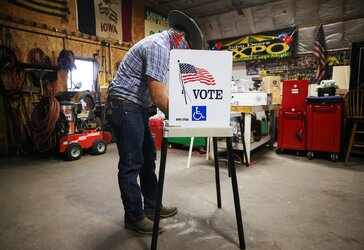
Rural voters do not give Democrats credit for much good. And rural voters may indeed support policies and politicians that seem, from an outside perspective, to undermine their own economic interests. | Mario Tama/Getty Images
Here’s some of what the research, properly understood, does tell us about rural America.
Rural communities, much like disadvantaged neighborhoods in urban areas, are more likely to suffer from chronic health conditions, a challenge compounded by the closure of local hospitals and a shortage of health care providers. Rural economies often struggle with limited employment opportunities and infrastructure deficits, issues that should resonate with many post-industrial urban areas facing similar challenges. Additionally, educational disparities persist across the U.S., with rural schools facing funding shortfalls and teacher shortages that parallel urban struggles to provide equitable educational opportunities.
And it is this divide I find particularly troubling — that so many rural and urban areas suffer from similar ailments but remain politically divided. It is not one solved by the new rage peddlers.
I can anticipate the frustrated Democratic response: “We tried to give them what they want, and they continue to vote against their interests.” Waldman said as much in 2022: “One thing you absolutely cannot say is that Democrats don’t try to help rural America. In fact, they probably work harder at it than Republicans do.”
I agree, to a point. Rural voters do not give Democrats credit for much good. And rural voters may indeed support policies and politicians that seem, from an outside perspective, to undermine their own economic interests.
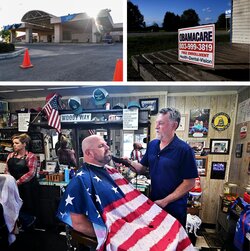
Rural communities, much like disadvantaged neighborhoods in urban areas, are more likely to suffer from chronic health conditions, a challenge compounded by the closure of local hospitals and a shortage of healthcare providers. Rural economies often struggle with limited employment opportunities. | Melina Mara/The Washington Post via Getty Images; Michael S. Williamson/The Washington Post via Getty Images; Frederic J. Brown/AFP via Getty Images
However, that is exactly what a focus on resentment helps us to understand. This is not rage against the people trying to help. Nor is it an excuse. Resentment, instead, asks us to consider how rural voters’ choices are frequently rooted in values and place-based identities that place a strong emphasis on self-reliance, local control and a profound sense of injustice regarding the lack of recognition for rural contributions to society.
There is no “mystery” to it. Rural Americans often prioritize their way of life over immediate economic gains that are often promised (and not always delivered) by policy solutions. My research suggests that their perceived resistance to certain policies, and especially a political party that advocates for a multitude of governmental correctives, is a complex reaction stemming from years of economic transition, dislocation and yes, harm from policies they were told would help.
Sure, “Hollywood didn’t kill the family farm and send jobs overseas. ... College professors didn’t pour mountains of opioids in rural communities,” as Schaller and Waldman write. But rural people do know that federal agriculture and trade policies pushed by Democrats and Republicans did destroy many rural economies. Rural people do know that liberal elites stood by as rural students became one of the least likely groups to attend college, and one of the most likely to drop out. So they benefit from Obamacare and vote against it; can rural people contain multitudes, too?
Taken as a whole, rural voters are not merely reacting against change — be it demographic or economic. They are actively seeking to preserve a sense of agency over their future and a continuity of their community’s values and social structures. Some might call this conservatism, but I think it is the same thing motivating fears of gentrification in urban areas, or the desire to “keep Portland weird.” Place matters for a whole bunch of people — but especially for rural folks.
Consider the fact, as I discuss in my book, that rural Americans are the most likely to say that if given the chance, they would never want to leave their community, while at the same time they are the most likely to say that children growing up in their specific community will have to leave in order to live productive lives. Could any single policy solve that dilemma?
Instead of a politics that seeks to understand and represent these contradictions, the left wants to simplify ruralness into something it’s not. In the immediate aftermath of 2016, blaming rural people was a way to make sense of the surprise of Trump’s election. This latest obsession with rage is the next chapter, a kind of collective cry of frustration from tired progressives: “We give up!” There is a general tendency among the readers of the New York Times and viewers of MSNBC to think about politics in purely transactional terms: We give you these benefits, you give us your votes. And rural voters, as Waldman is right to note, aren’t living up to that supposed bargain.
But this flies in the face of what research on resentment actually tells us. For many rural residents, the solutions they seek may not always come neatly packaged as government policies, white papers or policy briefs pumped out of a campaign war room. I’ve found that resentments exist because self-reliance and local problem-solving is intrinsic to rural identity, and self-reliance is something by nature resistant to government policies emanating from Washington, D.C.

A real rural movement is already here. It is the rural movement towards the Republican Party that has been building since the 1980s. It existed before Donald Trump and will exist after Trump leaves politics. | Bastien Inzaurralde/AFP via Getty Images; Mark Makela/Getty Images
What rural communities may desire are empowering strategies that allow them to shape their own future — support that bolsters local leadership, encourages community-driven initiatives and provides the tools and resources necessary for them to address their specific challenges in a manner consistent with their values. That isn’t rage, nor is it a threat to democracy.
I sometimes hope that progressives will realize that this fits in with their commitment to multiculturalism and local diversity. But the eagerness with which “white rural rage” has been seized upon by some segments of the chattering classes shows a readiness to simply write off white rural America; notably, Schaller’s previous book similarly argued that the Democratic Party should simply give up on competing in the South. (So long, Georgia!)
There is no better way to make the case for giving up on rural areas than to say that this segment of America represents a threat to the country’s very existence.
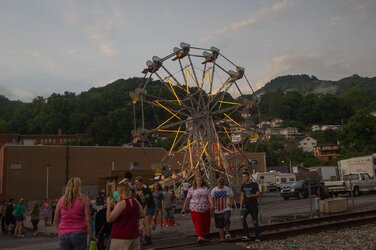
People celebrate the Fourth of July in the coal town of Logan in southern West Virginia. If rage leads us to conclude that Democrats — and democracy — should just abandon rural voters, then resentment, at the very least, points in the opposite direction. | Andrew Lichtenstein/Corbis via Getty Images
fter portraying white rural America as an obstacle to democracy (and the Democratic Party), Schaller and Waldman call for a “ real rural movement” to “use the power they have, and start demanding something more concrete.”
What they miss is that a real rural movement is already here. It is the rural movement towards the Republican Party that has been building since the 1980s. It existed before Trump and will exist after Trump leaves politics. And it is baffling why these new, self-proclaimed saviors of rural America cannot see that their gross mischaracterization of rural life feeds into the resentments driving that movement.
I can imagine a politics that actually confronts rural resentment. True, it is much harder to imagine. Academic research is great at contextualizing and contextualizing the contextualization. It is not always forward-looking. But if rage leads us to conclude that Democrats — and democracy — should just abandon rural voters, then resentment, at the very least, points in the opposite direction.
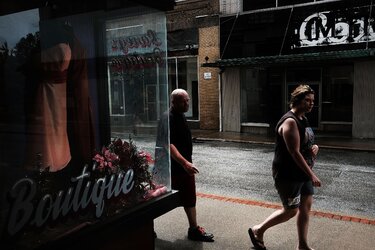
A couple walks past a business in Welch, West Virginia. Rural resentment — that sense of place, the anxieties felt about one’s community, the deeply engrained feeling that urban America would erase rural ways of living if given the chance — that is a predictor of support for Donald Trump only in rural America. | Spencer Platt/Getty Images
First and foremost, understanding rural resentment would mean acknowledging the profound geographic inequities that exist in the U.S., and that those inequities are a powerful motivator of political behavior. They are not the same as rage, racism, xenophobia and nationalism. It is distinctive.
The assumption that rural whites are motivated primarily by racism is especially pernicious. A politics that learned the lessons of rural resentment would not deny that racial divisions are present throughout rural America, but would recognize that racial animus can exist alongside other motivations.
The fact is that racial resentment has long predicted support for conservative candidates in American elections no matter where voters live. Did racially resentful whites in 2012 vote for Obama? No. So what explains the massive shift among so many rural voters who cast ballots for Obama in 2012 but for Trump just four years later? Maybe he primed racial animus to a higher degree. Maybe he made it openly acceptable to say certain things. Or maybe he spoke to different motivations that expanded his constituency alongside other motivations, including white grievance, that were already fully cemented in the rural Republican coalition.
That is what the data show. The data do not show that rural America is devoid of racial resentment. The data do not show that urban America is either. Indeed, racial resentment is a powerful predictor of support for Trump throughout America, as I show in my book. But rural resentment — that sense of place, the anxieties felt about one’s community, the deeply engrained feeling that urban America would erase rural ways of living if given the chance — that is a predictor of Trump support only in rural America.
Moreover, these motivations are found among both white and nonwhite rural voters. To be sure, this area of research remains difficult. About 20 percent of rural America is made up of racial and ethnic minorities, and it is complicated and expensive to gather enough data on this minority of an already small minority of rural residents.
I’ve put time and money into the question, and have collected survey data with sample sizes sufficiently large enough to say something about racial politics in rural communities. Absolutely, a divide exists, and rural whites are more likely than urban whites to hold stereotypes about racial and ethnic minorities. But nonwhite Americans living in rural communities also seem to share these geography-based grievances with their white neighbors — something we have not yet found in urban America. Many are also motivated by a sense of place — a motivation that may also be driving many to leave the Democratic Party this November. According to the 2020 Cooperative Election Study out of Harvard, which collected nearly 2,000 nonwhite rural responses, nearly 30 percent of nonwhite voters in rural communities voted for Donald Trump last election; data I collected this past February containing 1,500 nonwhite rural voters also show a shift towards Trump that mirrors what other polls have found. And while more nonwhite voters are saying they will cast a ballot for Trump, in rural communities, the shift is even more dramatic.
At this point, the onus falls on Democratic officials and candidates to do something different because they are the ones losing rural voters election after election. They’ll need to acknowledge that a laundry list of policy “solutions” is likely to fall on deaf ears. I’m sympathetic to the policy argument. Democrats are currently providing financial support and federal investments in rural communities that may make a difference. Broadband and bridges matter. Why shouldn’t Biden take credit for this massive influx of cash that could contradict the idea that these communities are “left behind?”
But it is often not enough given the historic underinvestments that plague many rural areas; and Democratic “solutions” have yet to solve the health care crisis, the jobs crisis, the growing number of teacher shortages. Celebrate, sure. Acknowledge the long road ahead, too.
It is also true that federal involvement has a tendency to irreparably change the character of many communities. The scars of federal tinkering — from land use policy to free trade agreements to dead-end retraining programs — are still very visible. And so, the dilemma for Democrats is that getting the policies right won’t be enough. They will need new messaging to address the emotions that fuel the rising tide of resentment in rural communities. That is the political problem.
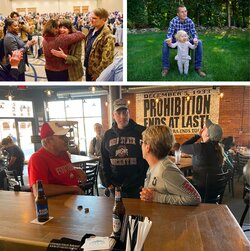
Top left: Marie Gluesenkamp Perez (center) hugs supporters. Top right: Jared Golden, with his daughter Rosemary, speaks to a reporter at his home. Bottom: Tim Ryan (center) speaks with people at a bar and grill. Gluesenkamp Perez, Golden and Ryan are Democratic candidates who are successful in rural communities. | Taylor Balkom/The Columbian via AP; Robert F. Bukaty/AP; David Siders/POLITICO
I wish there was a trick to solving that political problem. I’m not a political strategist or a communications expert. But I believe that the first place to start is acknowledging that the divisions between rural and urban America are more than material ones. Look at Democratic candidates who are successful in rural communities — Jared Golden, Tim Ryan, Marie Gluesenkamp Perez. They do not just talk about rural deprivation and rural impoverishment, as real as it often is in their states. They celebrate rural communities’ resiliency; they acknowledge the pride of place that is present throughout rural America; they see different values that are not reflected in opinion polls and snappy campaign slogans, but rather speak to different ways of living that draw some people to the countryside, problems and all. It helps that they are authentically rural and do not pretend to be something they are not. Candidates still matter, even in a highly nationalized campaign environment.
On specific issues, this politics would acknowledge that rural and nonrural Trump voters see issues through different lenses, even if, come Election Day, they are voting the same way; you have to talk to them differently. On immigration, it would mean accepting the fact that, in some communities, particularly those with financial challenges, concerns about the social burden of immigration is not always an expression of hate. It would look at a data point on distrust in media and seek out a reason — perhaps a self-critical one — for why rural people are the most likely to feel like news does not portray their communities accurately. It would speak directly to the challenge posed by artificial intelligence and technological progress that, once again, will likely concentrate benefits among those who have already benefited and leave rural communities behind. It will see the moral costs as well as the economic costs of those developments — the end to heritage industries, the pollution of the land, the erasure of rural dignity — and recognize how demoralizing it is to be told that they should just learn to code “ for God’s sake.”
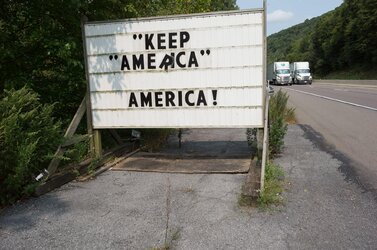
A politics of empathy and shared authorship and civic engagement would give agency back to Americans who call rural areas home. | Andrew Lichtenstein/Corbis via Getty Images
And it would give agency back to the 1 in 5 Americans who call rural areas home, not through a lengthy list of policy correctives but through a politics of empathy and shared authorship and civic engagement. Is that really so hard?
Nicholas Jacobs is a political scientist who teaches American politics and research methods at Colby College. He is co-author of the 2023 book The Rural Voter: The Politics of Place and the Disuniting of America.
Politico (archive.ph)
By Nicholas F. Jacobs
2024-04-05 09:00:00GMT

Illustration by Benedetto Cristofani for POLITICO
If you’ve been watching television or tracking trending topics over the last few weeks, you’ve probably seen or read something about “white rural rage.” This is owed to the publication of a new book, White Rural Rage, by Tom Schaller and Paul Waldman, whose thesis is that white rural Americans, despite representing just 16 percent of the American electorate, are a “threat to the world’s oldest constitutional democracy.”
In an interview on MSNBC’s Morning Joe, Schaller gave this unvarnished assessment of the rage he sees overflowing in the heartland. Rural whites, he said, are “the most racist, xenophobic, anti-immigrant, anti-gay geo-demographic group in the country.” He called them, “the most conspiracist group,” “anti-democratic,” “white nationalist and white Christian nationalists.” On top of that, rural whites are also “most likely to excuse or justify violence as an acceptable alternative to peaceful public discourse.”
This premise has triggered a backlash towards rural voters from some on the left. Amanda Marcotte, writing for Salon, said she’s tired of handling rural voters “with kid gloves,” and time has come to pop the “racist, homophobic, sexist bubble” they all live in. Daily Beast columnist Michael Cohen agreed, writing that “these aren’t hurtful, elitist stereotypes by Acela Corridor denizens and bubble-dwelling liberals… they’re facts.” David Corn, the D.C. bureau chief at Mother Jones, piled on, agreeing that “white rural voters [are] the slice of the public that endangers the constitutional future of the republic.”
This latest obsession with rural rage is nothing new. After 2016, when rural voters in Michigan, Wisconsin and Pennsylvania put former President Donald Trump over the top, Democrats tried to figure out why they had gone so sour on the Democratic Party. Some liberal thinkers called out the left’s reflexive condescension and dismissal of rural voters that escalated during the George W. Bush administration and peaked with Hillary Clinton’s campaign and her dismissal of Trump supporters as a “basket of deplorables.” Some said the party should increase attention to rural issues and nearby rural communities.
But don’t be misled. The publication and widespread celebration of White Rural Rage among progressive circles is doing something different than those post-2016 post-mortems. It is not an attempt to understand the needs and concerns of rural America. Instead, it’s an outpouring of frustration with rural America that might feel cathartic for liberals, but will only serve to further marginalize and demonize a segment of the American population that already feels forgotten and dismissed by the experts and elites.
The people doing the work of protecting democracy in rural America recognized this immediately. The morning of the MSNBC interview, I woke up to a mountain of messages and threads from rural organizers, community activists and local officials from across the country. Each one was distressed over what they considered the authors’ harsh and hurtful accusations about the communities they cherish and strive to uplift.
What seemingly set apart this book is that the authors claimed to have data backing up their assertions. “We provide the receipts,” Schaller said in the interview. What is their data, my friends and colleagues asked, and why do they get it so wrong?
Imagine my surprise when I picked up the book and saw that some of that research was mine.
I’m an academic who studies rural Americans and lives in rural Maine. My job and passion is to pore over reams of data, including some of the largest surveys of rural voters ever conducted. Sitting on my computer are detailed responses from over 25,000 rural voters that I have conducted over the last decade and used to publish a range of peer-reviewed and widely cited research. And I’ve done it all largely to make sense of why rural voters are continually drawn to the Republican Party.
But the thing about rage — I’ve never found it.
The problem with this “rage” thesis is much larger than the fact that my research, and that of others, is being misinterpreted and misunderstood. What the authors are getting wrong about rural America is exactly what many Democrats have been getting wrong for decades — and appear to be doing so again in this critical presidential election year.

Academics can and do disagree on what is motivating non-college-educated whites to vote for Donald Trump. | Andrew Lichtenstein/Corbis via Getty Images
***
Beyond the weaknesses of this one book, and the prospects of another deeply divisive election, this new rage thesis worries me.
Academics can and do disagree on what is motivating non-college-educated whites to vote for Donald Trump. I don’t pretend that we have settled on a single answer. I do know that there is something particular about Trump’s appeal in rural America and that demographics alone do not explain it. In rural America, women are more likely to vote for Trump; so are young people; so are poor as well as rich. Place matters.
But ruralness is not reducible to rage. And to say so is to overlook the nuanced ways in which rural Americans engage in politics. They are driven by a sense of place, community and often, a desire for recognition and respect. This, as I have recently argued in a new book, is the defining aspect of the rural-urban divide — a sense of shared fate among rural voters, what academics call a “politics of place,” that is expressed as a belief in self-reliance, rooted in local community and concerned that rural ways of living will soon be forced to disappear.
In recent years, that rural political identity has morphed into resentment — a collective grievance against experts, bureaucrats, intellectuals and the political party that seeks to empower them, Democrats.
Yes, such resentment is a real phenomenon in rural areas. But words matter; rage and resentment are not interchangeable terms. Rage implies irrationality, anger that is unjustified and out of proportion. You can’t talk to someone who is enraged. Resentment is rational, a reaction based on some sort of negative experience. You may not agree that someone has been treated unfairly, but there is room to empathize.
Research both by me and by others has illuminated how resentment is driven by the complex rural identity that, while occasionally intersecting with national political currents, is rooted in the unique context of rural life. Rage, both as a soundbite and as presented in the book, oversimplifies and misrepresents these debates. And so does the assumption that all the holders of these views are white, and that this rage is motivated by racism. Racism exists in all parts of the country and is embedded in American politics. But what the research shows is that while there are deep and persistent racial resentments in rural communities, despite a slight correlation between the two, rural resentment is an attitude distinct from racial prejudice.

Paul Waldman and Tom Schaller suggest that since authoritarianism predicted support for Donald Trump in the 2016 Republican primaries, and rural residents support Trump, rural residents are the most likely to be authoritarian. | Spencer Platt/Getty Images
So far, Republicans are the political party that has figured out how to speak to that rural identity effectively.
I sympathize with the idea that, as Schaller and Waldman and many other commentators have pointed out, in terms of policies, Democrats arguably do more for rural areas and rural residents than Republicans do. After Democrats passed Obamacare, rural residents stood to gain the most in states that expanded Medicaid, but two-thirds of uninsured rural residents missed out because they lived in states that refused to expand coverage — and those states were almost exclusively governed by Republicans. Paul Krugman is often quick to point out that “ because rural America is poorer than urban America, it pays much less per person in federal taxes, so in practice major metropolitan areas hugely subsidize the countryside.” And it is true that the Biden administration is currently overseeing billions in new federal spending that is disproportionately going to rural communities across America.
So, the problem Democrats haven’t been able to solve isn’t policy; it’s politics. And Democrats who give in to the simplistic rage thesis are essentially letting themselves off the hook on the politics, suggesting that rural Americans are irrational and beyond any effort to engage them.
That would be a massive mistake, one that does truly threaten democracy. Democrats have an opportunity to do better in rural America. We need them to do better, not because Democrats’ policy fixes are always the solution, but because our political system only works when competitive elections hold officials accountable. One-party dominance throws the system off-center, misrepresents interests, sows distrust.
The first step for Democrats is to start thinking — and talking — about rural America right.

In the immediate aftermath of 2016, blaming rural people was a way to make sense of the surprise of Donald Trump’s election. | Michael S. Williamson/The Washington Post via Getty Images
***
Reading White Rural Rage won’t help with that. The authors have no expertise in rural issues and conducted no original research for the book. They approached the topic as journalists and committed the same errors countless reporters have made when they share with the outside world what they saw from a few days traversing some small town in “ flyover country” — an occurrence all the more routine as local newspapers in rural America shutter.
The authors of White Rural Rage make two persistent types of error in analyzing the data on rural Americans.
First, they routinely fall victim to the logical fallacy of composition when they attribute group characteristics to individuals. For example, they suggest that since authoritarianism predicted support for Donald Trump in the 2016 Republican primaries, and rural residents support Trump, rural residents are the most likely to be authoritarian. (That’s like concluding that because Massachusetts tends to vote Democratic, and Massachusetts is a wealthy state, wealthy people must vote Democratic … but the opposite is true.)
As it happens, the opposite seems to be true in this case as well; leading authoritarian experts find no geographic dimension to growing authoritarianism in the U.S., and the study the authors cite early in the book to “prove” that rural residents are “more likely to favor violence over democratic deliberation” says nothing about violence, or deliberation or authoritarianism. Work by scholars they cite actually shows the opposite, too: Rural residents are less, not more, likely to support political violence.
This same logical fallacy comes into play when they weave together a string of facts about Christian nationalists: Because white evangelicals are most likely to support Christian nationalist beliefs, and because 43 percent of rural residents identify as evangelical, they assert that the hotbed of Christian nationalism is in rural communities. The same goes for their assertions about QAnon. Perhaps the worst guilt-by-association error is found right in the title; even in the reddest of rural counties, 20 to 30 percent of voters — still largely white — routinely support Democrats. One might ask why, given all the supposed rage, are some rural Americans still voting for Democrats, election after election? You wouldn’t know it from the title or press tour, but Schaller and Waldman must frequently hedge their bets in the text, acknowledging that just a minority of rural residents often believe the most headline-grabbing factoid.

About 20 percent of rural Americans are non-white, and research shows that they share the same geography-based grievances as their white neighbors and are increasingly voting Republican. | David Goldman/AP
The second persistent error is that they cite polling data with little attention to issues of quality, which less sloppy scholars would question to make sure their conclusions were valid. For instance, some of the most salacious data points on race and immigration are taken from polls with just a few dozen rural residents; anyone trained in statistics would recognize that is too small a sample size to consider the result representative or reliable. The “birther” claim they like to throw about — that rural residents are more likely to believe that Barack Obama wasn’t born in the United States — comes from a “study” by a polling firm called Public Policy Polling, a firm with dubious credentials that not only seems to exist primarily to lampoon conservative voters, but that also, in this case, drew results about “rural America” from just two states.
And I’m not cherry-picking examples. I’ve reviewed every publicly available survey and poll the authors use, have published my concerns on each one here, and have concluded that only two surveys in the entire book conform to basic standards of survey research and even attempt to try and present an accurate picture of rural America.
Some examples in the book do not even have bad data to rely upon. For instance, the authors assert that there is support in white rural America for so-called constitutional sheriffs — local law officials who make brazen claims about their authority to violate state and national laws in defense of the Constitution. Although several pages are devoted to describing a handful of these officials, not a single study of public opinion is cited in that section to show whether the sheriffs enjoy support outside of the counties where they were elected in (usually low-turnout) races.
What’s more, the rage thesis conflicts with findings from more rigorous research. As recently as January of this year, my colleague Dan Shea and I searched for exactly these types of attitudes. Interested in whether President Joe Biden’s campaign message about democracy being on the line would resonate with rural voters, we tested the hypothesis, drawing on a representative sample of rural voters.
Bottom line: The “threats” to democracy just aren’t there. Our research found that just 27 percent of rural voters — including 23 percent of rural Trump voters — think that if the opposing candidate wins in November, “people will need to take drastic action in order to stop [Biden or Trump] from taking office.” That’s the exact same proportion — 27 percent — as voters in urban and suburban areas who hold the same view. Nor are rural voters more likely than urban voters to say that the opposing party is a “threat to the future of America;” while 38 percent of rural Trump voters strongly believe that about Democrats, 36 percent of nonrural Biden voters think that same thing about Republicans.
To be sure, 27 percent isn’t a negligible number of people in a country of 330 million. But the threats to democracy that lurk in America are not specific to rural areas. Importantly, and often overlooked by the rage peddlers, is the flip side of those numbers — that more than 60 percent of both sets of voters, a strong majority of Americans, both rural and urban, do not hold those attitudes.
This shoddy analysis and faux expertise does real damage. It is clear that the overwhelming portrayal of rural America as angry and irrational feeds into and amplifies the divisions between rural and urban Americans, overshadowing the shared challenges and aspirations that cut across these geographic lines.

Rural voters do not give Democrats credit for much good. And rural voters may indeed support policies and politicians that seem, from an outside perspective, to undermine their own economic interests. | Mario Tama/Getty Images
***
Here’s some of what the research, properly understood, does tell us about rural America.
Rural communities, much like disadvantaged neighborhoods in urban areas, are more likely to suffer from chronic health conditions, a challenge compounded by the closure of local hospitals and a shortage of health care providers. Rural economies often struggle with limited employment opportunities and infrastructure deficits, issues that should resonate with many post-industrial urban areas facing similar challenges. Additionally, educational disparities persist across the U.S., with rural schools facing funding shortfalls and teacher shortages that parallel urban struggles to provide equitable educational opportunities.
And it is this divide I find particularly troubling — that so many rural and urban areas suffer from similar ailments but remain politically divided. It is not one solved by the new rage peddlers.
I can anticipate the frustrated Democratic response: “We tried to give them what they want, and they continue to vote against their interests.” Waldman said as much in 2022: “One thing you absolutely cannot say is that Democrats don’t try to help rural America. In fact, they probably work harder at it than Republicans do.”
I agree, to a point. Rural voters do not give Democrats credit for much good. And rural voters may indeed support policies and politicians that seem, from an outside perspective, to undermine their own economic interests.

Rural communities, much like disadvantaged neighborhoods in urban areas, are more likely to suffer from chronic health conditions, a challenge compounded by the closure of local hospitals and a shortage of healthcare providers. Rural economies often struggle with limited employment opportunities. | Melina Mara/The Washington Post via Getty Images; Michael S. Williamson/The Washington Post via Getty Images; Frederic J. Brown/AFP via Getty Images
However, that is exactly what a focus on resentment helps us to understand. This is not rage against the people trying to help. Nor is it an excuse. Resentment, instead, asks us to consider how rural voters’ choices are frequently rooted in values and place-based identities that place a strong emphasis on self-reliance, local control and a profound sense of injustice regarding the lack of recognition for rural contributions to society.
There is no “mystery” to it. Rural Americans often prioritize their way of life over immediate economic gains that are often promised (and not always delivered) by policy solutions. My research suggests that their perceived resistance to certain policies, and especially a political party that advocates for a multitude of governmental correctives, is a complex reaction stemming from years of economic transition, dislocation and yes, harm from policies they were told would help.
Sure, “Hollywood didn’t kill the family farm and send jobs overseas. ... College professors didn’t pour mountains of opioids in rural communities,” as Schaller and Waldman write. But rural people do know that federal agriculture and trade policies pushed by Democrats and Republicans did destroy many rural economies. Rural people do know that liberal elites stood by as rural students became one of the least likely groups to attend college, and one of the most likely to drop out. So they benefit from Obamacare and vote against it; can rural people contain multitudes, too?
Taken as a whole, rural voters are not merely reacting against change — be it demographic or economic. They are actively seeking to preserve a sense of agency over their future and a continuity of their community’s values and social structures. Some might call this conservatism, but I think it is the same thing motivating fears of gentrification in urban areas, or the desire to “keep Portland weird.” Place matters for a whole bunch of people — but especially for rural folks.
Consider the fact, as I discuss in my book, that rural Americans are the most likely to say that if given the chance, they would never want to leave their community, while at the same time they are the most likely to say that children growing up in their specific community will have to leave in order to live productive lives. Could any single policy solve that dilemma?
Instead of a politics that seeks to understand and represent these contradictions, the left wants to simplify ruralness into something it’s not. In the immediate aftermath of 2016, blaming rural people was a way to make sense of the surprise of Trump’s election. This latest obsession with rage is the next chapter, a kind of collective cry of frustration from tired progressives: “We give up!” There is a general tendency among the readers of the New York Times and viewers of MSNBC to think about politics in purely transactional terms: We give you these benefits, you give us your votes. And rural voters, as Waldman is right to note, aren’t living up to that supposed bargain.
But this flies in the face of what research on resentment actually tells us. For many rural residents, the solutions they seek may not always come neatly packaged as government policies, white papers or policy briefs pumped out of a campaign war room. I’ve found that resentments exist because self-reliance and local problem-solving is intrinsic to rural identity, and self-reliance is something by nature resistant to government policies emanating from Washington, D.C.

A real rural movement is already here. It is the rural movement towards the Republican Party that has been building since the 1980s. It existed before Donald Trump and will exist after Trump leaves politics. | Bastien Inzaurralde/AFP via Getty Images; Mark Makela/Getty Images
What rural communities may desire are empowering strategies that allow them to shape their own future — support that bolsters local leadership, encourages community-driven initiatives and provides the tools and resources necessary for them to address their specific challenges in a manner consistent with their values. That isn’t rage, nor is it a threat to democracy.
I sometimes hope that progressives will realize that this fits in with their commitment to multiculturalism and local diversity. But the eagerness with which “white rural rage” has been seized upon by some segments of the chattering classes shows a readiness to simply write off white rural America; notably, Schaller’s previous book similarly argued that the Democratic Party should simply give up on competing in the South. (So long, Georgia!)
There is no better way to make the case for giving up on rural areas than to say that this segment of America represents a threat to the country’s very existence.

People celebrate the Fourth of July in the coal town of Logan in southern West Virginia. If rage leads us to conclude that Democrats — and democracy — should just abandon rural voters, then resentment, at the very least, points in the opposite direction. | Andrew Lichtenstein/Corbis via Getty Images
***
fter portraying white rural America as an obstacle to democracy (and the Democratic Party), Schaller and Waldman call for a “ real rural movement” to “use the power they have, and start demanding something more concrete.”
What they miss is that a real rural movement is already here. It is the rural movement towards the Republican Party that has been building since the 1980s. It existed before Trump and will exist after Trump leaves politics. And it is baffling why these new, self-proclaimed saviors of rural America cannot see that their gross mischaracterization of rural life feeds into the resentments driving that movement.
I can imagine a politics that actually confronts rural resentment. True, it is much harder to imagine. Academic research is great at contextualizing and contextualizing the contextualization. It is not always forward-looking. But if rage leads us to conclude that Democrats — and democracy — should just abandon rural voters, then resentment, at the very least, points in the opposite direction.

A couple walks past a business in Welch, West Virginia. Rural resentment — that sense of place, the anxieties felt about one’s community, the deeply engrained feeling that urban America would erase rural ways of living if given the chance — that is a predictor of support for Donald Trump only in rural America. | Spencer Platt/Getty Images
First and foremost, understanding rural resentment would mean acknowledging the profound geographic inequities that exist in the U.S., and that those inequities are a powerful motivator of political behavior. They are not the same as rage, racism, xenophobia and nationalism. It is distinctive.
The assumption that rural whites are motivated primarily by racism is especially pernicious. A politics that learned the lessons of rural resentment would not deny that racial divisions are present throughout rural America, but would recognize that racial animus can exist alongside other motivations.
The fact is that racial resentment has long predicted support for conservative candidates in American elections no matter where voters live. Did racially resentful whites in 2012 vote for Obama? No. So what explains the massive shift among so many rural voters who cast ballots for Obama in 2012 but for Trump just four years later? Maybe he primed racial animus to a higher degree. Maybe he made it openly acceptable to say certain things. Or maybe he spoke to different motivations that expanded his constituency alongside other motivations, including white grievance, that were already fully cemented in the rural Republican coalition.
That is what the data show. The data do not show that rural America is devoid of racial resentment. The data do not show that urban America is either. Indeed, racial resentment is a powerful predictor of support for Trump throughout America, as I show in my book. But rural resentment — that sense of place, the anxieties felt about one’s community, the deeply engrained feeling that urban America would erase rural ways of living if given the chance — that is a predictor of Trump support only in rural America.
Moreover, these motivations are found among both white and nonwhite rural voters. To be sure, this area of research remains difficult. About 20 percent of rural America is made up of racial and ethnic minorities, and it is complicated and expensive to gather enough data on this minority of an already small minority of rural residents.
I’ve put time and money into the question, and have collected survey data with sample sizes sufficiently large enough to say something about racial politics in rural communities. Absolutely, a divide exists, and rural whites are more likely than urban whites to hold stereotypes about racial and ethnic minorities. But nonwhite Americans living in rural communities also seem to share these geography-based grievances with their white neighbors — something we have not yet found in urban America. Many are also motivated by a sense of place — a motivation that may also be driving many to leave the Democratic Party this November. According to the 2020 Cooperative Election Study out of Harvard, which collected nearly 2,000 nonwhite rural responses, nearly 30 percent of nonwhite voters in rural communities voted for Donald Trump last election; data I collected this past February containing 1,500 nonwhite rural voters also show a shift towards Trump that mirrors what other polls have found. And while more nonwhite voters are saying they will cast a ballot for Trump, in rural communities, the shift is even more dramatic.
At this point, the onus falls on Democratic officials and candidates to do something different because they are the ones losing rural voters election after election. They’ll need to acknowledge that a laundry list of policy “solutions” is likely to fall on deaf ears. I’m sympathetic to the policy argument. Democrats are currently providing financial support and federal investments in rural communities that may make a difference. Broadband and bridges matter. Why shouldn’t Biden take credit for this massive influx of cash that could contradict the idea that these communities are “left behind?”
But it is often not enough given the historic underinvestments that plague many rural areas; and Democratic “solutions” have yet to solve the health care crisis, the jobs crisis, the growing number of teacher shortages. Celebrate, sure. Acknowledge the long road ahead, too.
It is also true that federal involvement has a tendency to irreparably change the character of many communities. The scars of federal tinkering — from land use policy to free trade agreements to dead-end retraining programs — are still very visible. And so, the dilemma for Democrats is that getting the policies right won’t be enough. They will need new messaging to address the emotions that fuel the rising tide of resentment in rural communities. That is the political problem.

Top left: Marie Gluesenkamp Perez (center) hugs supporters. Top right: Jared Golden, with his daughter Rosemary, speaks to a reporter at his home. Bottom: Tim Ryan (center) speaks with people at a bar and grill. Gluesenkamp Perez, Golden and Ryan are Democratic candidates who are successful in rural communities. | Taylor Balkom/The Columbian via AP; Robert F. Bukaty/AP; David Siders/POLITICO
I wish there was a trick to solving that political problem. I’m not a political strategist or a communications expert. But I believe that the first place to start is acknowledging that the divisions between rural and urban America are more than material ones. Look at Democratic candidates who are successful in rural communities — Jared Golden, Tim Ryan, Marie Gluesenkamp Perez. They do not just talk about rural deprivation and rural impoverishment, as real as it often is in their states. They celebrate rural communities’ resiliency; they acknowledge the pride of place that is present throughout rural America; they see different values that are not reflected in opinion polls and snappy campaign slogans, but rather speak to different ways of living that draw some people to the countryside, problems and all. It helps that they are authentically rural and do not pretend to be something they are not. Candidates still matter, even in a highly nationalized campaign environment.
On specific issues, this politics would acknowledge that rural and nonrural Trump voters see issues through different lenses, even if, come Election Day, they are voting the same way; you have to talk to them differently. On immigration, it would mean accepting the fact that, in some communities, particularly those with financial challenges, concerns about the social burden of immigration is not always an expression of hate. It would look at a data point on distrust in media and seek out a reason — perhaps a self-critical one — for why rural people are the most likely to feel like news does not portray their communities accurately. It would speak directly to the challenge posed by artificial intelligence and technological progress that, once again, will likely concentrate benefits among those who have already benefited and leave rural communities behind. It will see the moral costs as well as the economic costs of those developments — the end to heritage industries, the pollution of the land, the erasure of rural dignity — and recognize how demoralizing it is to be told that they should just learn to code “ for God’s sake.”

A politics of empathy and shared authorship and civic engagement would give agency back to Americans who call rural areas home. | Andrew Lichtenstein/Corbis via Getty Images
And it would give agency back to the 1 in 5 Americans who call rural areas home, not through a lengthy list of policy correctives but through a politics of empathy and shared authorship and civic engagement. Is that really so hard?
Nicholas Jacobs is a political scientist who teaches American politics and research methods at Colby College. He is co-author of the 2023 book The Rural Voter: The Politics of Place and the Disuniting of America.